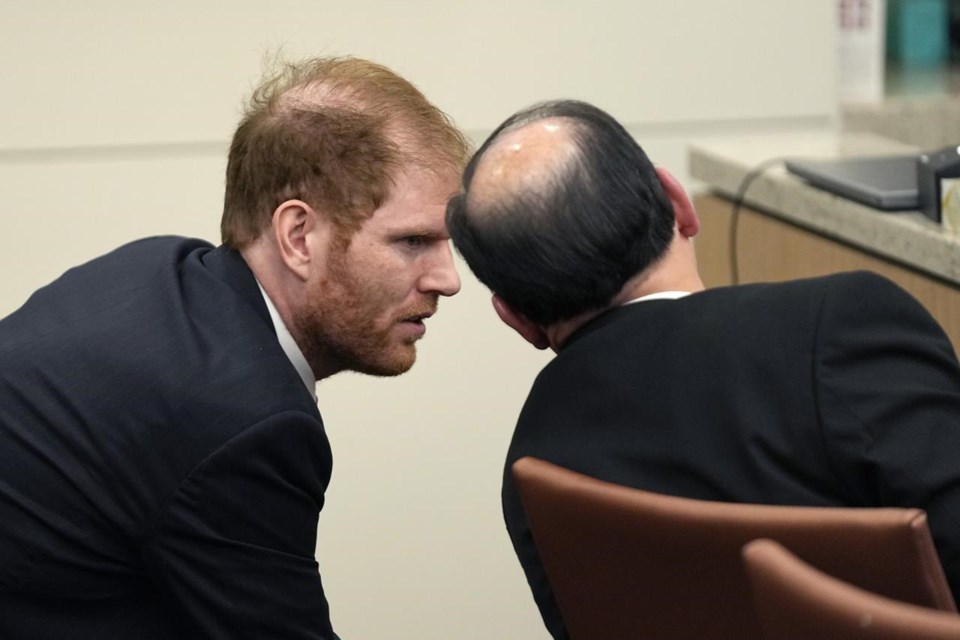PHOENIX (AP) — An election official and lobbyists were among the witnesses brought by Maricopa County attorneys on the first day of a trial Thursday in another lawsuit filed by Kari Lake, the defeated Republican in last year's Arizona governor's race, to deny her request to see signed ballot envelopes of 1.3 million early voters.
The former TV anchor has already lost two trials that challenged her by more than 17,000 votes. In the second trial, a judge about ballot signature-verification efforts in Maricopa County, home to Phoenix and where more than 60% of the state’s voters live.
Lake's latest case doesn’t challenge her defeat but instead is a public records lawsuit that asks to review all early ballot envelopes with voter signatures in the state's most populous county, where officials had denied her request for those documents.
The trial began with Maricopa County Superior Court Judge John Hannah rejecting three witnesses proposed by Bryan Blehm, Lake's attorney. They included two members of We the People Arizona Alliance who testified at her second trial. Calling one “obviously unqualified" to talk on this matter, the judge said he intended to keep the case narrowly focused.
“Why the person says they need the records — that’s irrelevant. We start from there and balance the state’s interest — whatever it says the reasons are for non-disclosure,” Hannah said.
Most of the morning's proceedings were spent hearing testimony from Maricopa County Recorder Stephen Richer. His office typically received 40 “garden variety” public records requests a year. In 2022, the office saw over 1,300 public record requests. Some of them have enabled harassment against election workers, Richer said.
He asserted the county was following state law when it rejected Lake's request for the ballot envelopes.
“We can’t release this, which is why we’ve said no to this plaintiff and others as well. It’s not discriminatory,” Richer said when questioned by attorneys for the county.
Releasing the ballot affidavit envelopes could have a “chilling effect” and lead to some voters either not voting or deliberately not signing their ballots, he added.
Blehm, the attorney representing Lake, argued that there are other documents with people's signatures that are available to the public such as property deeds. Signatures are already out in the open and “in the stream of commerce,” he argued.
Marilyn Rodriguez, a lobbyist whose clients include the Arizona Coalition to End Sexual and Domestic Violence, also argued that making the signed ballot envelopes public would rob victims of their privacy.
The two-day trial will resume Monday.
Lake is among the most vocal of last year’s Republican candidates promoting former President Donald Trump’s election lies, which she made the centerpiece of her campaign. While most other election deniers around the country conceded after losing their races in November, Lake did not. She is openly considering a run for the U.S. Senate and is regarded as a contender to be Trump’s running mate in his 2024 campaign.
Initially, Lake’s challenge focused on problems with ballot printers at some polling places in Maricopa County. The produced ballots that were too light or too small for the paper and therefore couldn't be read by the on-site tabulators at polling places. Amid the confusion, lines were backed up in some areas. Lake claimed the printer problems were done intentionally and caused her to lose, but she was unable to prove that.
In mid-February, the Arizona Court of Appeals rejected Lake’s assertions, concluding she presented no evidence that voters whose ballots were unreadable by tabulators at polling places were not able to vote.
During Lake's second trial, which focused on a claim about the signature-verification process, her lawyers said there was a flood of mail-in ballots in Maricopa County at a time when there were too few workers to verify ballot signatures. They also alleged the county ultimately accepted thousands of ballots that had been rejected earlier by workers for having mismatched signatures.
Attorneys for Arizona election officials said the workers’ speculation about the signature-verification process did not amount to a violation of the law or misconduct by election workers, and raised questions about whether the workers truly knew the ultimate outcome of the ballots they had flagged.
A judge ultimately concluded Lake didn’t present evidence backing up her claim. Lake is appealing the decision.
In Lake’s public records lawsuit, lawyers for county officials argued that ballot envelopes can't be publicly released unless signatures are redacted, saying Arizona statute makes it a felony to disclose voters’ signatures and that Lake meets none of the exceptions to the law. They also said disclosing early ballot envelopes wouldn’t promote the best interest of the state, and would invite voter fraud and put the public at risk of identity theft.
In Arizona, the envelopes for early voting ballots serve as affidavits in which voters declare, under penalty of perjury, that they are registered to vote in the county, haven’t already voted and will not vote again in that election.
Lake’s lawyer has argued that the ballot envelopes aren’t entitled to privacy protections simply because they contain signatures and that the denial of records prevents Lake from monitoring election activity.
In May, the Arizona Supreme Court sanctioned Lake’s lawyers $2,000 for making false statements when saying more than 35,000 ballots had been improperly added to the total ballot count.
Jacques Billeaud And Terry Tang, The Associated Press




